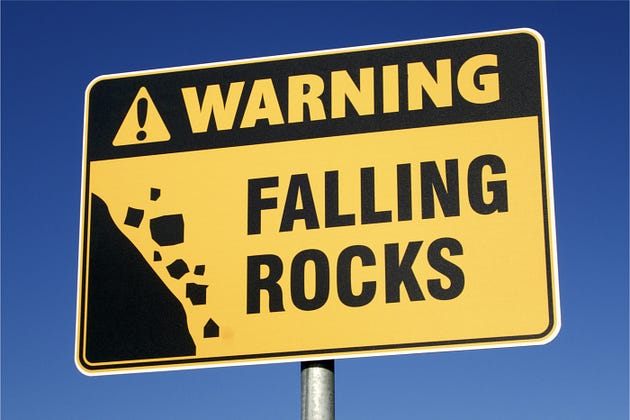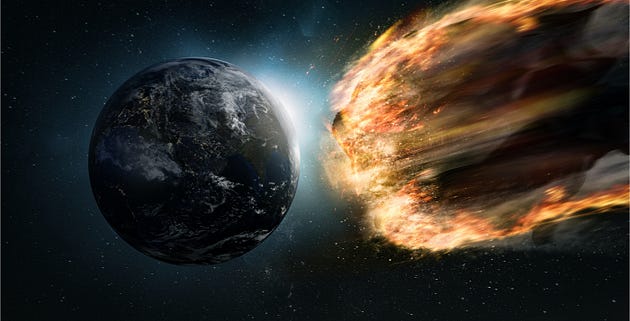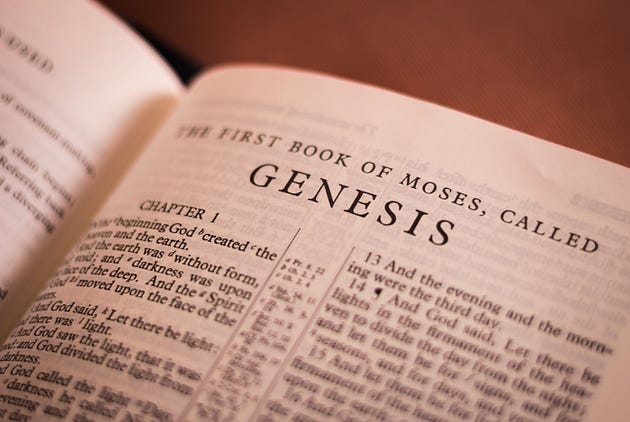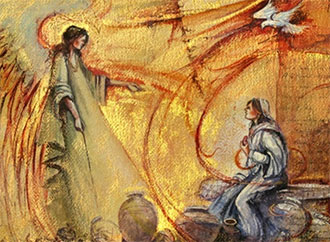When are your personal theological beliefs a problem? You might be thinking, “What I believe is none of your business!” In a way, you’re right. But when your personal beliefs go beyond the “personal” and affect my life — or anyone else’s — in a negative way, they become a problem.

My wife and I went into Hobby Lobby the other day — you know, because we’re not living through record-breaking inflation or anything — and I glanced at the bookshelf by the checkout line as we were checking out. They had about 10 books for sale. Three stood out to me:
Creation to Babel by Ken Ham
The Harbinger II by Jonathan Cahn
Fault Lines by Voddie Baucham
Do you know what these books have in common? One, they represent the fundamentalist-evangelical leanings of Hobby Lobby, obviously (no big deal — we know where Hobby Lobby stands). Two, and most importantly, they each influence evangelicals’ theology in such a way that they begin to negatively affect other lives.
These books represent the three doctrines evangelicals have used to become a nuisance to others: origins, eschatology, and ethics.
When Your Doctrine of Origins Becomes a Problem
The doctrine of origins, according to Ken Ham, is the foundation for all Christian doctrine. That means that if you don’t get Genesis right (translation: if you don’t agree with his modern interpretation of Genesis), you have no authoritative foundation for anything else you believe. Obviously, that’s preposterous. But I will say that he is on to something:
Your doctrine of origins does determine the importance you place upon truth.
If you accept or are at least open to the scientific realities of evolution and an old earth, for example, that means that you have decided to let truth dictate your beliefs. If you blindly reject the scientific consensus and accept the pseudoscience peddled by Ken Ham and his ilk just because you think it’s “biblical,” you have decided to let your beliefs dictate the “truth” as you want it. So Ken Ham is right: Your doctrine of origins is the foundation. But if you subscribe to his ideas, what a weak foundation it is.
His organization, Answers in Genesis, exists to spread his false doctrines throughout the world, and their ultimate goal (though they wouldn’t put it this way) is to scare Christians away from science. That is a very, very dangerous thing.
I’m a public school English teacher, and science teachers throughout the South have told me that they have to be careful using the term “evolution” in science class because they fear pushback from parents. While our students are learning about evolution in class, I have seen students’ parents share Ken Ham/AiG articles on their Facebook pages as a way to conflict with that is being taught in schools. So Ken Ham has empowered his followers in such a way that they are actually hindering science education in public schools. If this is you …
Your theology has become a problem.
I would argue that one’s beliefs about origins extend to other scientific beliefs as well. You saw it during the height of the Covid-19 pandemic. Who were the ones most likely to reject the advice from scientists about mask-wearing and the vaccine? Fundamental evangelicals who already had permission from their faith to reject science. If a scientist also accepts evolution (an almost certainty), why would evangelicals believe them about anything else? Actually, I remember seeing this happen on Facebook: Bill Nye posted a video encouraging mask-wearing, and a prominent faith leader commented with, “Bill Nye rejects God’s creation and accepts evolution, so why would I believe anything he says?” I fear that this phenomenon is common in evangelicalism, and your doctrine of origins has affected your trust of science so that you reject sound medical advice and spread that misinformation to others. If this is you …
Your theology has become a problem.
This mindset also extends to climate change. Indeed, Ken Ham himself said, “Bottom line: if scientists reject the events of history such as the Flood as recorded in the Bible, they will have wrong interpretations about climate change.” Ken Ham’s doctrine of origins directly affects his view on climate change, and since Ken Ham has the ear of millions of evangelicals, he is leading them to reject the threat of climate change for similar reasons. Therefore …
Their theology has become a problem.
When Your Eschatology Becomes a Problem
This presents a great segue to the next problem doctrine: eschatology. Now, to be fair, there are some eschatological systems that aren’t a problem most of the time: postmillennialism suggests that the world will get better before the return of Christ, so postmillennialists are at least trying to make the world a better place (as long as they aren’t part of the dominionist postmillennialists, like DeMar and others of that flavor); preterism teaches that the return has already happened and that the kingdom of Christ is here and is charged with making the world a better place for a future that could extend for thousands or millions of years, so that doctrine actually has positive potential. But the eschatology of fundamental evangelicals — the eschatology of The Harbinger, Left Behind, John MacArthur, Hal Lindsay, etc. et al. — premillennialism, especially dispensationalism, is a different animal; it basically forces its adherents to want the world to burn so their savior will return.
Piggybacking off of the climate change topic, John MacArthur — a devoted dispensationalist— once said regarding climate change, “God intended us to use this planet, to fill this planet for the benefit of man. Never was it intended to be a permanent planet. It is a disposable planet. Christians ought to know that.” In another sermon he said, “It’s just all going to burn up; it’s just rearranging the deck chairs on the Titanic.” John MacArthur doesn’t care about the world. Why? His eschatology teaches him that the world is going to burn up any day now, and it’s God’s plan, so why worry about it? In fact, we shouldn’t hinder God’s plans by trying to save the planet if he plans to destroy it anyway. And the problem is that he has the ear of millions of evangelicals who, likewise, reject climate change and choose to show indifference to the problems of the physical world. If this is you …
Your theology has become a problem.
Faulty eschatology, particularly dispensational premillennialism, also influences bad foreign policy. Ask any American fundamental evangelical what the most important nation on the earth is, and I would bet everything I own that the answer (other than, maybe, America) would be Israel. In the American South, where evangelicalism is the leading faith tradition, you’ll see plenty of Israel flags flying alongside the American flag. You’ll see plenty of “I Stand with Israel” bumper stickers. A large church in my area, World Outreach Church in Murfreesboro, TN, is basically free PR for the Zealous Zionists who back an Israel take-over of the Middle East.
This issue, like others, also involves taking lives. American fundamental evangelicals will align with Israel on almost any issue — they are God’s people, after all. If Israel starts a conflict with an innocent nation, you better believe American evangelicals would side with Israel. In one of John MacArthur’s sermons, he taught that Israel is being guided by God right now to be the light of the world once again. Therefore, pretty much anything they do goes.
It causes American evangelicals to lose it when the U.S. government gives money to clinics that provide abortions but look the other way when they send money to Israel, who is very liberal on abortion; it causes them to make plans to usurp other faiths in the region in order to rebuild some fabled third temple (something they teach but isn’t found in the Bible); it causes them to disregard the tens of thousands of innocent people who have been killed or misplaced through Israel’s settlement expansion over the decades. If this is you …
Your theology has become a problem.
In my opinion, the saddest thing bad eschatology leads Christians to do is to avoid the problems of the world and instead look for escape. Dispensationalists — which is what the majority of American fundamental evangelicals are — believe that a secret rapture will remove Christians from the world before the Great Tribulation. That’s not found in the Bible, but it guides their approach to almost every bad thing that happens in the world.
A tornado wipes out a town: “Oh God, please return and take us away from this suffering.” A child dies from cancer: “Lord, please call us home.” America legalizes gay marriage: “God in Heaven, please return, remove us from this wicked world, and rain your judgment down upon it!” The list could go on and on and on. When a terrible thing happens — either actually terrible, like a devastating tornado, or terrible to evangelicals, like a Democrat being elected — find a news story on social media in an area dominated by fundamental evangelicalism and try to count the comments pleading for God to return and take them from this world. It’s a hobby of mine, but it depresses me.
It’s a problem when your theology leads you to ask God to remove you from the situation instead of helping to clean up a tornado-devastated town; it’s a problem when your theology leads you to ask God to take you away after a child dies from cancer rather than to contribute to the solution. I even saw one person on social media say that Christians shouldn’t try to end homelessness and world hunger because the world must get worse before Jesus returns. Whenever you ask God to give you an escape or to ignore the most vulnerable in the world rather than asking God to empower you to make a positive difference in your current situation …
Your theology has become a problem.
When Your Doctrine of Ethics Becomes a Problem
Asking God to escape from the world means you are choosing to ignore its problems rather than face them. That’s what I think of when I see Voddie Baucham’s Fault Lines sitting on the shelf at Hobby Lobby. What Fault Lines does is offer fundamental evangelicals a way to escape from the reality of racism in the United States. Using his teaching (which is shared by many), fundamental evangelicals have a way to distance themselves from the issues social justice advocates seek to address. By using terms like “woke” and “Marxist” loosely, Baucham helps create the “boogey-man” mindset many Christians have toward any secular solution to the world’s problems. Just as “the flood” is Ken Ham’s answer to any issue raised at his beliefs, “the gospel” is Voddie Baucham’s answer to any issue addressed by social justice advocates. To him, if the gospel can’t fix the problem, then the problem must not really exist.
To Baucham and others, any worldly solution is anti-Christ, and the problem it seeks to address often ceases to be a problem at all in their minds. For example, critical race theory is seen as a “woke” solution to the racist problem that, to them, isn’t much of a problem at all. Therefore, we see many evangelicals neglecting their role of displaying God’s love in the world by ignoring one of the most repugnant issues we face: racism. Even if you don’t agree with every aspect of CRT (like sociologist George Yancey, who approaches the issue differently but still approaches it seriously), you are putting a “gospel” mask on the problem and not actually addressing the root causes, so …
Your theology has become a problem.
Baucham’s family ethics are also affecting lives other than those that believe them. He teaches a level of discipline that borders abuse and feels that Christian parents must basically beat their children into submission. Sure, I received plenty of spankings (though I didn’t deserve any of them, obviously), and most of history has made use of this style of discipline, but modern advances in science, sociology, psychology, and other disciplines show that child discipline is not as black and white as that. Yet many Christians read his words and feel that they must engage in that level of violent discipline in order to please God, even if it isn’t right for their particular child.
Furthermore, Baucham has an archaic view of women. Check out Rick Pidcock’s article about this. Here are a few things he believes: like his friend John MacArthur, he believes that women in abusive marriages should suck it up, suffer for Jesus, and not tell anyone so they don’t bring shame upon the church; he believes that men should witness their potential wife submit to her father so he knows she’ll submit to him; he believes that daughters should stay at home and serve their fathers (often without furthering their own education) until they get married and go with their husbands to stay at home and serve them. Therefore, we see influential “celebrity pastors” like Voddie Baucham influencing Christians in such a way that they could very well end up traumatizing their children — physically, emotionally, mentally, spiritually — and negatively affecting their ability to function as adults, as well as purposely holding women back from living out their dreams and potential. If you subscribe to this doctrine of family and gender ethics …
Your theology has become a problem.
The same could be said for guns and the LGBTQ+ community: fundamental evangelicals too often find themselves defending gun rights over victims (even child victims) of senseless gun violence when research confirms that gun control measures would save lives; fundamental evangelicals too often ignore the existence of LGBTQ+ members of society and vote for legislation that would remove their rights to enjoy the freedom all Americans deserve just because their personal interpretation of the Bible tells them that being gay is a sin. In both of these cases (check out this piece about how Christians misinterpret Scripture to support gun rights), these Christians elevate their personal beliefs to a level so that they actually believe they have a right to force their opinions upon others. If this is you; if you believe your personal opinions should dictate how others live their lives …
Your theology has become a problem.
Conclusion
If the single most important aspect of your theology is not loving others, then you’re doing it wrong. And if you truly love others — the way Jesus did — you won’t care about what they wear, where they live, what they believe, who they love, or anything else; you will just love them. And if you love others, you won’t let your personal beliefs get in the way of acting out that love.
If you don’t seriously believe that your faith empowers you to act in a way that brings justice, peace, and love to the world and to contribute to a future that could very well be positive for every one, you don’t really have faith — you have an excuse to do nothing.
In short, if your theology keeps you from pursuing truth, keeps you from trying to make the world a better place, forces you to treat anyone without the respect all people deserve, and doesn’t have true love as its central tenet …
Your theology is a problem.












